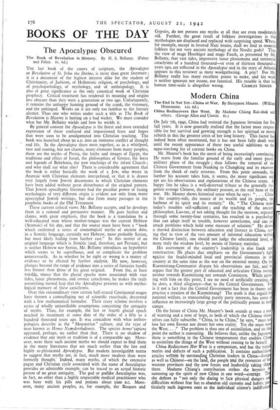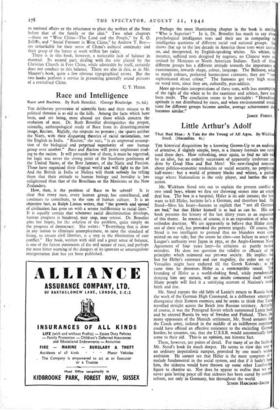Modern China
The End Is Not Yet—China at War. By Herrymon Maurer. (William Heinemann. 12S. 6d.) China Rediscovers Her West. By Madame Chiang Kai-shek and others. (George Allen and Unwin. 6s.)
ON July 7th, 1942, China had resisted the Japanese invasion for five full years. It is now generally realised that the factor most respon- sible for her survival and growing strength is her spiritual or moral rebirth in this the greatest crisis of her long history. This factor has indeed been often mentioned, but it has not been fully dealt with until the recent appearance of these two useful additions to the npne-too-long list of current books on China.
Mr. Maurer's book has the merit of being increasingly convincing. He starts from the familiar ground of the early and more purely military phase of the struggle; follows the removal of the Chinese Government from Naning to Chungking and its recovery from the shock of early reverses. From this point onwards, the further his account takes him, it seems, the more significant and apt are his observations and explanations of the Chinese scene. A happy line he takes is a well-deserved tribute to the generally for- gotten average Chinese, the ordinary peasant, as the real hero of the war. Mr. Maurer shows historical sense when he says: " . . . China is the country-side, the source of its wealth and its people, the harbour of its spirit and its eternity." Or, " The Chinese make today's troubles self-sufficient ; and the teaching of the ancient philosopher, Lao-tze, of not taking thought for the morrow, repeated through some twenty-four centuries, has resulted in a psychology that can adapt itself to trouble, however unwelcome, and can yet attack problems which hold some measure of solution." He draws a shrewd distinction between education and literacy in China, say- ing that in view of the vast amount of informal education within the Chinese family, one should not judge the educational level, or more truly the wisdom level, by means of literacy statistics.
His assessment of the country's leadership is also frank and constructive. He places due emphasis on the Government's fight against the feudal-minded local and provincial elements in the country at the same time as the war on the external enemy. On the Kuomintang-Communist dispute his observations are fair, and he argues that the greater part of educated and articulate China swings neither towards Kuomintang nor towards Comintern. While agree- ing with him on this point, I see no need of artificially creating, as he does, a third allegiance—that to the Central Government. Foe is it not a fact that the Central Government has been in theory and practice a creation of the Kuomintang? The truth is that regard fo national welfare, as transcending purely party interests, has come influence an increasingly large group of the politically potent in both camps. On the future of China Mr. Maurer's book sounds at once a note of warning and a note of hope, to both of which the Chinese them- selves can fully subscribe. " China, to be China," he says, " must no lose her own flavour nor desert her own reality. Yet she must met the West...." The problem is thus one of assimilation, and on point the author is reassuring. He believes that, unlike ihe Japan there is something in the Chinese temperament that enables C to assimilate the things of the West without ceasing to be herself.
China Rediscovers Her West is a symposium, and has the rYP1 merits and defects of such a publication. It contains authoritati articles written by outstanding Christian leaders in China—fore: as well as Chinese—on the land, the people and the resources of h western provinces and the new forces and leadership taking sill there. Madame Chiang's contribution strikes the keynote summing up the spirit of new China in one word—courage. she defines as " not only the daring to face physical dangers difficulties without fear but to abandon old customs and habits, Pg ticularly such ingrown ones as the individual citizen's inclifferen
to national affairs or the reluctance to place the welfare of the State before that of the family or the clan." Two other chapters —those on " West China—The Land and the People," by R. 0. Jolliffe, and " Social Ferment in West China," by Andrew T. Roy— are remarkable for their sense of China's cultural continuity and their grasp of the forces at work within her today. There is in this book, however, a noticeable lack of balance in material. Its second part, dealing with the role played by the Christian Church in Free China, while admirable by itself, certainly does not conduce to this balance. There are also in this, as in Mr. Maurer's book, quite a few obvious typographical errors. But the two books perform a service in presenting generally sound pictures of a revitalised China.
C. Y. HSIEH.



























 Previous page
Previous page